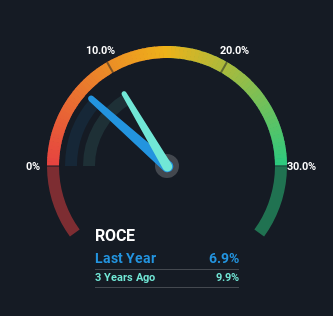Here's What's Concerning About Rosenbauer International's (VIE:ROS) Returns On Capital

If we want to find a stock that could multiply over the long term, what are the underlying trends we should look for? One common approach is to try and find a company with returns on capital employed (ROCE) that are increasing, in conjunction with a growing amount of capital employed. Basically this means that a company has profitable initiatives that it can continue to reinvest in, which is a trait of a compounding machine. In light of that, when we looked at Rosenbauer International (VIE:ROS) and its ROCE trend, we weren't exactly thrilled.
Return On Capital Employed (ROCE): What Is It?
Just to clarify if you're unsure, ROCE is a metric for evaluating how much pre-tax income (in percentage terms) a company earns on the capital invested in its business. To calculate this metric for Rosenbauer International, this is the formula:
Return on Capital Employed = Earnings Before Interest and Tax (EBIT) ÷ (Total Assets - Current Liabilities)
0.069 = €42m ÷ (€1.3b - €655m) (Based on the trailing twelve months to March 2024).
Thus, Rosenbauer International has an ROCE of 6.9%. Even though it's in line with the industry average of 6.9%, it's still a low return by itself.
Check out our latest analysis for Rosenbauer International

Above you can see how the current ROCE for Rosenbauer International compares to its prior returns on capital, but there's only so much you can tell from the past. If you'd like, you can check out the forecasts from the analysts covering Rosenbauer International for free.
What The Trend Of ROCE Can Tell Us
On the surface, the trend of ROCE at Rosenbauer International doesn't inspire confidence. Around five years ago the returns on capital were 13%, but since then they've fallen to 6.9%. However, given capital employed and revenue have both increased it appears that the business is currently pursuing growth, at the consequence of short term returns. And if the increased capital generates additional returns, the business, and thus shareholders, will benefit in the long run.
Another thing to note, Rosenbauer International has a high ratio of current liabilities to total assets of 52%. This effectively means that suppliers (or short-term creditors) are funding a large portion of the business, so just be aware that this can introduce some elements of risk. Ideally we'd like to see this reduce as that would mean fewer obligations bearing risks.
In Conclusion...
In summary, despite lower returns in the short term, we're encouraged to see that Rosenbauer International is reinvesting for growth and has higher sales as a result. These trends don't appear to have influenced returns though, because the total return from the stock has been mostly flat over the last five years. So we think it'd be worthwhile to look further into this stock given the trends look encouraging.
If you want to continue researching Rosenbauer International, you might be interested to know about the 1 warning sign that our analysis has discovered.
For those who like to invest in solid companies, check out this free list of companies with solid balance sheets and high returns on equity.
If you're looking to trade Rosenbauer International, open an account with the lowest-cost platform trusted by professionals, Interactive Brokers.
With clients in over 200 countries and territories, and access to 160 markets, IBKR lets you trade stocks, options, futures, forex, bonds and funds from a single integrated account.
Enjoy no hidden fees, no account minimums, and FX conversion rates as low as 0.03%, far better than what most brokers offer.
Sponsored ContentNew: AI Stock Screener & Alerts
Our new AI Stock Screener scans the market every day to uncover opportunities.
• Dividend Powerhouses (3%+ Yield)
• Undervalued Small Caps with Insider Buying
• High growth Tech and AI Companies
Or build your own from over 50 metrics.
Have feedback on this article? Concerned about the content? Get in touch with us directly. Alternatively, email editorial-team (at) simplywallst.com.
This article by Simply Wall St is general in nature. We provide commentary based on historical data and analyst forecasts only using an unbiased methodology and our articles are not intended to be financial advice. It does not constitute a recommendation to buy or sell any stock, and does not take account of your objectives, or your financial situation. We aim to bring you long-term focused analysis driven by fundamental data. Note that our analysis may not factor in the latest price-sensitive company announcements or qualitative material. Simply Wall St has no position in any stocks mentioned.
About WBAG:ROS
Rosenbauer International
Engages in the production and sale of systems for firefighting and disaster protection worldwide.
Reasonable growth potential and slightly overvalued.


